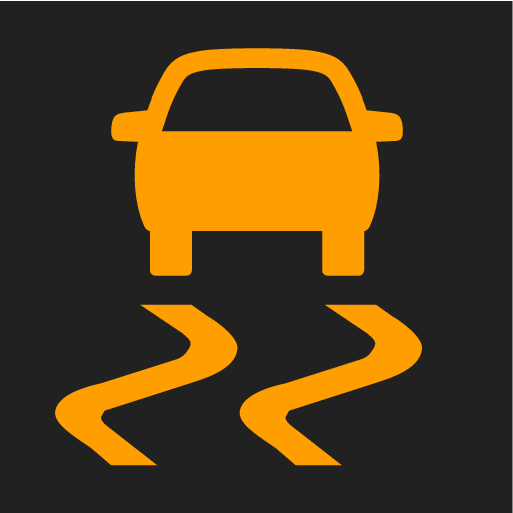
The driver display shows this symbol when the system is engaged.
Braking from the system may be heard as a pulsing sound, and the car may accelerate more slowly than expected when applying the throttle.
- Stability function2
- Spin control and traction control system
- Engine Drag Control
- Trailer stability assist
- Roll Stability Control
Warning
- The function is supplementary driver support intended to facilitate driving and make it safer – it cannot handle all situations in all traffic, weather and road conditions.
- The driver is advised to read all sections in the Owner's Manual that relate to this function to learn about factors such as its limitations and what the driver should be aware of before using the system.
- Driver support functions are not a substitute for the driver's attention and judgement. The driver is always responsible for ensuring the car is driven in a safe manner, at the appropriate speed, with an appropriate distance to other vehicles, and in accordance with current traffic rules and regulations.
Stability function2
The function checks the driving and brake force of the wheels individually in order to stabilise the car.
Spin control and traction control system
The function is active at low speed and brakes the drive wheels that spin so that additional traction shall be transferred to the drive wheels that are not spinning.
The function can also prevent the driving wheels from spinning against the road surface during acceleration.
Engine Drag Control
Engine Drag Control (EDC3) can prevent involuntary wheel locking, e.g. after shifting down or engine braking when driving in low gear on slippery road surfaces.
Involuntary wheel locking while driving can, amongst other things, impair the driver's ability to steer the car.
Trailer stability assist*4
Trailer stability assist (TSA5) stabilises a car towing a trailer in situations where they begin snaking.
Note
Roll Stability Control
This function reduces the risk of overturning, for example during a sudden evasive manoeuvre or if the car skids. The system registers if and how much the car's lateral inclination changes. This information is used to calculate the risk of the car overturning. If the car is at risk, its electronic stability control system engages, the engine torque is reduced and one or more wheels are braked until the car has regained its stability.